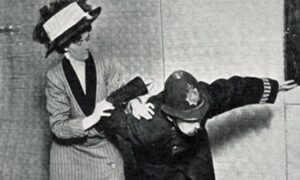Doctor Curmudgeon® “Deeds Not Words”
By Diane Batshaw Eisman, M.D. FAAP Doctor Eisman is in Family Practice in Aventura, Florida with her partner, Dr. Eugene Eisman, an internist/cardiologist
The Edwardian Era was not an easy time to be a woman in the United Kingdom. This was the reign of King Edward, VII—between 1901 and 1910.
Not only were women denied the right to vote, but it was a time of severe restrictions for them.
In the Edwardian era, ‘respectable’ women would not remove their gloves in public… women were expected to be subservient, meek and live their lives almost entirely in the domestic sphere. In Edwardian Britain, the ideal place of women was in the home,” comments the website of the BBC History Magazine, EHistory Extra.
Edith Garrud, political activist and the first British woman to become a Martial Arts instructor, became involved with the suffragette movement. She had written prolifically about Jujitsu as a means to protect women against brutal men. She often referred to the Martial Arts as a “Husband-tamer.”
Garrud did not intend for Jujitsu be used by the suffragettes in their scuffles with the police. However, her writings exhorting women to become proficient in the Martial Arts had captivated Emmeline Pankhurst, organizer of the Suffragette group Women’s Social and Political union (WSPU).
Pankhurst realized the Martial Arts could serve a different purpose. Expertise in Martial Arts could show the government that women were capable of defending themselves against the police. If they were proficient in the Martial Arts, these heroic fighting women could bring about social changes.
It was inevitable that Edith Garrud would become involved with Pankhurst and join the WSPU. The WSPU was much more aggressive than previous women’s suffrage groups. Their motto was “Deeds Not Words.”
To bring attention to their cause, they smashed up store fronts and blew up postal boxes. They bought licenses to carry guns and hid wooden clubs in their dresses. A WSPU member never knew when she would be involved in a hand to hand skirmish with a London police officer. The police would retaliate by bringing out their truncheons against the activists. The suffragettes were then arrested, of course.
The jailed suffragettes went on hunger strikes. The government then ordered the police to step in and force feed them. When the women became dangerously weakened, the police were compelled to release them.
Jail and hunger did not stop the British suffragettes. They continued their marches demanding the right to vote.
Edith Garrud had been energized by the rough treatment of the police to Pankhurst’s marchers. It didn’t take much for Pankhurst to convince Garrud to teach self-defense to the suffragettes. Jujitsu was not about vanquishing your opponent with brute force. Garrud taught them how to use your antagonist’s weight and movements against him.
In 1909, the WSPU presented a “Women’s Exhibition”. Garrud was asked to demonstrate Jujitsu.
The right to vote for women who were over the age of thirty and were property holders was passed by Parliament in 1918.
Dr. Scott Mclaughlin writes in the website, The Collector, “With the outbreak of the First World War in 1914 the militancy of the WSPU came to an end, amidst a split in leadership and shift to a nationalist pro-government position. Not, however, before martial arts had played a significant role in ushering the women’s movement into the political spotlight.”
Dr. Curmudgeon suggests “Bitter Medicine”, Dr. Eugene Eisman’s story of his experiences–from the humorous to the intense—as a young army doctor serving in the Vietnam War.
Bitter Medicine by Eugene H. Eisman, M.D. –on Amazon
Doctor Curmudgeon® is Diane Batshaw Eisman, M.D., a physician-satirist. This column originally appeared on SERMO, the leading global social network for doctors.
SERMO www.sermo.com
Click Here to Order Boxing Interviews Of A Lifetime By “Bad” Brad Berkwitt


